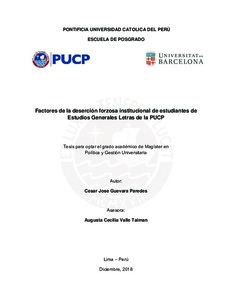| dc.contributor.advisor | Valle Taiman, Augusta Cecilia | |
| dc.contributor.author | Guevara Paredes, César José | es_ES |
| dc.date.accessioned | 2019-02-27T17:09:05Z | es_ES |
| dc.date.available | 2019-02-27T17:09:05Z | es_ES |
| dc.date.created | 2018 | es_ES |
| dc.date.issued | 2019-02-27 | es_ES |
| dc.identifier.uri | http://hdl.handle.net/20.500.12404/13561 | |
| dc.description.abstract | La deserción universitaria implica tanto el alejamiento voluntario como involuntario del
estudiante de la institución. Es un fenómeno presente en todo tipo de universidades,
públicas o privadas. Existen diferentes iniciativas para explicar y prevenir este
alejamiento. La mayor parte de investigaciones se centran en el abandono voluntario del
estudiante. Este trabajo aborda la deserción forzosa institucional como consecuencia del
incumplimiento de los requisitos mínimos académicos establecidos en el reglamento.
Este trabajo tiene como finalidad identificar los factores asociados a la deserción forzosa
institucional en los Estudios Generales Letras de la Pontificia Universidad Católica del
Perú. Como muestra se aborda la cohorte de ingresantes en el 2015-1 y 2015-2.
La investigación parte de una aproximación cuantitativa y profundiza con un análisis
cualitativo de las solicitudes para retornar a la universidad presentadas por los estudiantes
en las que aducen las razones de su bajo rendimiento, por lo que perdieron su condición
de alumno. A partir de ello, se identifican los factores individuales, socioeconómicas,
académicas e institucionales que se reportan relacionados a la deserción forzosa.
Los resultados muestran que la deserción forzosa en los primeros semestres está
asociada a factores personales y académicos, y no tanto los factores socioeconómicos e
institucionales. Predominan subfactores como problemas de salud, psicológicos y falta de
organización por parte del estudiante. El análisis de los subfactores permite plantear que
los hábitos académicos de los alumnos no están suficientemente desarrollados para
asumir las tareas académicas de la universidad, las cuales requieren de autonomía en la
organización del estudio y el desarrollo de habilidades de lectura y redacción. Se presenta
una propuesta enfocada en la realización de talleres que fortalezcan sus hábitos de
estudio en los que se aborden técnicas de concentración, elaboración de resúmenes y
armado de horarios de estudio, y el desarrollo de la capacidad de comprensión lectora. | es_ES |
| dc.description.abstract | University drop-out rate implies both, the voluntary and involuntary withdrawal of the
student from the institution. It is a phenomenon that involves all types of universities, public
or private. There are different initiatives to explain and prevent this withdrawal. Most of the
research focuses on the student's voluntary drop-out. This paper approaches the
institutional forced drop-out as a consequence of noncompliance with the minimum
academic requirements set forth in the Regulation.
The purpose of this paper is to identify the factors associated with compulsory institutional
drop-out in in the General Studies - Arts at Pontificia Universidad Católica del Perú
(PUCP). All freshmen during the academic semesters 2015-1 and 2015-2 were part of the
study sample.
The research begins from a quantitative approach and deepens with a qualitative analysis
of the applications submitted by the students for returning to the university in which they
state out the reasons for their low academic performance, and why they lost their student
status at PUCP. On this basis, individual, socioeconomic, academic, and institutional
factors related to forced drop-out were identified.
The results show that forced drop-out in the first semesters is more associated to personal
and academic factors instead of socioeconomic and institutional factors. There are
prevailing subfactors of students; such as health and psychological problems as well as
lack of organization. The analysis of the subfactors makes it possible to state that the
student’s academic habits are not enough developed to assume the academic tasks of the
university studies, which require autonomy in the organization of the study and the
development of reading and writing skills.
Regarding the above context, it is presented a proposal focused on conducting workshops
that strengthen their study habits in which concentration techniques are approached,
preparation of summaries and creation of study schedules, and the development of
reading comprehension. | es_ES |
| dc.description.uri | Tesis | es_ES |
| dc.language.iso | spa | es_ES |
| dc.publisher | Pontificia Universidad Católica del Perú | es_ES |
| dc.rights | Atribución-CompartirIgual 2.5 Perú | * |
| dc.rights | info:eu-repo/semantics/openAccess | es_ES |
| dc.rights.uri | http://creativecommons.org/licenses/by-sa/2.5/pe/ | * |
| dc.subject | Educación superior--Perú | es_ES |
| dc.subject | Deserción universitaria--Perú | es_ES |
| dc.subject | Universidades--Deserción--Prevención | es_ES |
| dc.title | Factores de la deserción forzosa institucional de estudiantes de Estudios Generales Letras de la PUCP | es_ES |
| dc.type | info:eu-repo/semantics/masterThesis | es_ES |
| thesis.degree.name | Magíster en Política y Gestión Universitaria | es_ES |
| thesis.degree.level | Maestría | es_ES |
| thesis.degree.grantor | Pontificia Universidad Católica del Perú. Escuela de Posgrado | es_ES |
| thesis.degree.discipline | Política y Gestión Universitaria | es_ES |
| renati.discipline | 191847 | es_ES |
| renati.level | https://purl.org/pe-repo/renati/level#maestro | es_ES |
| renati.type | http://purl.org/pe-repo/renati/type#tesis | es_ES |
| dc.publisher.country | PE | es_ES |
| dc.subject.ocde | https://purl.org/pe-repo/ocde/ford#5.03.01 | es_ES |






